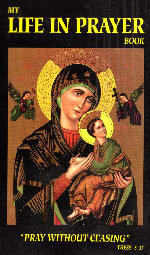
My Life In Prayer
NOVENA OF HOLY COMMUNIONS
From Holy Mother Church's Decree on Frequent Holy Communion

| HOME | SUMMA | PRAYERS | FATHERS | CLASSICS | CONTACT |
| CATHOLIC ENCYCLOPEDIA | A | B | C | D | E | F | G | H | I | J | K | L | M | N | O | P | Q | R | S | T | U | V | W | X | Y | Z |
| CATHOLIC SAINTS INDEX | A | B | C | D | E | F | G | H | I | J | K | L | M | N | O | P | Q | R | S | T | U | V | W | X | Y | Z |
| CATHOLIC DICTIONARY | A | B | C | D | E | F | G | H | I | J | K | L | M | N | O | P | Q | R | S | T | U | V | W | X | Y | Z |
 Keep Site Running
Keep Site Running

My Life In Prayer |
From Holy Mother Church's Decree on Frequent Holy Communion "The holy Synod would desire that at every Mass the faithful who are present should communicate, not only spiritually, by a loving desire in their hearts, but sacramentally, by the actual reception of the Eucharist." (Council of Trent, Sess. 22, ch. 6). "And this wish of the Council is in entire agreement with that desire wherewith Christ Our Lord was inflamed when He instituted this Divine Sacrament. For He Himself, more than once and in no uncertain terms, pointed out the necessity of eating His Flesh and drinking His Blood, especially in these words: 'This is the bread that came down from heaven. Not as your fathers did eat manna, and are dead. He that eateth this bread, shall live for ever.1 (John 6:59). Now, from this comparison of the Food of Angels with bread and with the manna, it was easily to be understood by His disciples that, as the Hebrews were daily nourished with manna in the desert, so the Christian soul might daily partake of this Heavenly Bread and be refreshed by It. Moreover, whereas in the Lord's Prayer we are urged to ask for 'our daily bread,' the holy Fathers of the Church all but unanimously teach that by these words must be understood, not so much that material bread which is the nourishment of the body, as the Eucharistic Bread, which ought to be our daily food. "Moreover, the desire of Jesus Christ and of the Church that all the faithful should daily approach the Sacred Banquet is directed chiefly to this end, that the faithful, being united to God by means of the Sacrament, may derive from It strength to resist their sensual passions, to cleanse themselves from the stains of daily faults and to avoid those graver sins which they commit through human weakness, so that the main purpose of Holy Communion is not that the honor and reverence due to Our Lord may be safeguarded, nor that the Sacrament may serve as a reward of virtue bestowed on those who receive It. .'Holy Communion is the remedy whereby we are delivered from daily faults and preserved from mortal sins.' (Sess. 13). "This desire on the part of God [that the faithful should daily approach the Sacred Banquet] was so well understood by the first Christians, that they daily flocked to the Holy Table as to a source of life and strength. 'And they continued steadfastly in the teaching of the apostles and in the communion of the breaking of the bread and in the prayers.' (Acts 2:42). And that this practice was to continue into later ages, not without great fruit of holiness and perfection, the holy Fathers and ecclesiastical writers testify... "Frequent and daily Communion, as a thing most earnestly desired by Christ Our Lord and by the Catholic Church, should be open to all the faithful of whatever rank and condition of life, so that no one who approaches the Holy Table with a right and devout intention can lawfully be hindered. "A right intention consists in this: He who approaches the Holy Table should do so, not out of routine or vain glory or human respect, but for the purpose of pleasing God, of being more closely united with Him by love and of seeking this Divine remedy for his weaknesses and defects... "Although it is more expedient that those who communicate frequently or daily should be free from venial sins, especially from such as are fully deliberate, and from any affection thereto, nevertheless, it is sufficient that they be free from mortal sin, with the purpose of never sinning mortally in the future; and if they have this sincere purpose, it is impossible that daily communicants should not gradually free themselves from even venial sins and from all affection to them."
** Important Note (From A Brief Catechism for Adults, by Fr. William J. Cogan, pp. 79-80, TAN Books.)
Copyright ©1999-2023 Wildfire Fellowship, Inc all rights reserved